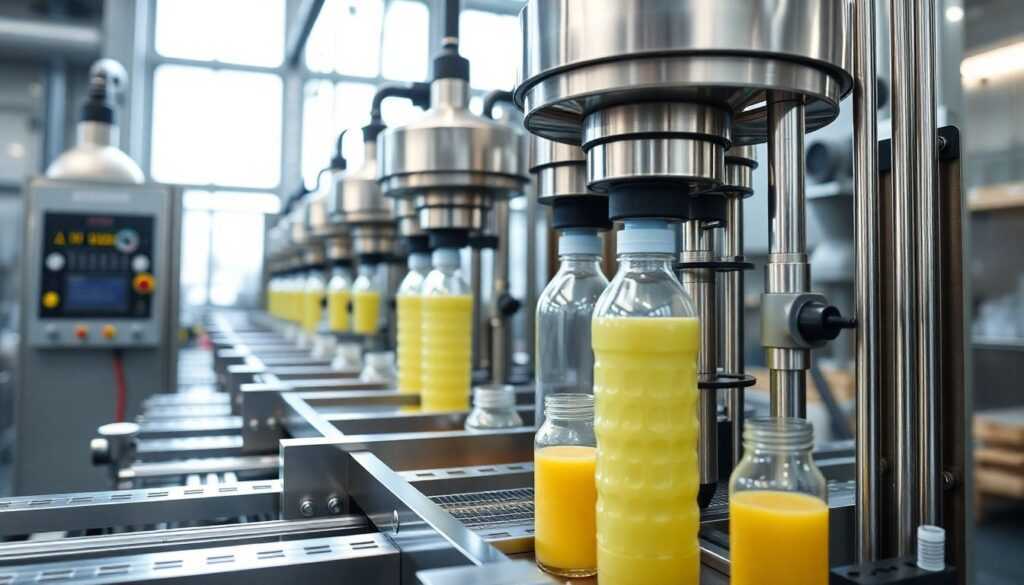In the fast-paced world of manufacturing, efficiency and precision are paramount. Filling machines play a crucial role in various industries, from food and beverage to pharmaceuticals and cosmetics. These machines are designed to accurately fill containers with liquids, powders, or granules, ensuring consistency and quality in every product. As production demands increase, the need for high-performance filling machines becomes more critical. This article delves into the world of filling machines, exploring their significance, technological advancements, and the impact they have on production lines.
High-performance filling machines for production lines
High-performance filling machines are engineered to meet the rigorous demands of modern production lines. These machines are equipped with advanced technology that enhances speed, accuracy, and reliability. One of the key features of high-performance filling machines is their ability to handle a wide range of products and container sizes, making them versatile for various industries.
For instance, in the food and beverage industry, filling machines must accommodate different viscosities and carbonation levels. This requires precise control mechanisms to ensure that each bottle or can is filled to the exact specifications. Similarly, in the pharmaceutical industry, filling machines must adhere to strict hygiene and safety standards, often incorporating clean-in-place (CIP) systems to maintain sterility.
Moreover, high-performance filling machines are designed to integrate seamlessly into existing production lines. This integration is crucial for maintaining a smooth workflow and minimizing downtime. Advanced models often feature automated systems that can adjust to different production speeds and product types without manual intervention, thereby increasing overall efficiency.
For more information on the various types of filling machines available, visit https://stm-pack.com/machines-categories/filling-machines/.
Technological advancements in filling machines
The evolution of filling machines has been driven by technological advancements that enhance their functionality and performance. One significant development is the incorporation of digital controls and sensors. These technologies allow for real-time monitoring and adjustments, ensuring optimal performance and reducing the risk of errors.
Another advancement is the use of robotics and automation in filling machines. Robotic arms and automated conveyors can handle delicate or hazardous materials with precision, reducing the need for human intervention and minimizing the risk of contamination. This is particularly important in industries such as pharmaceuticals and chemicals, where product integrity is paramount.
Additionally, the integration of IoT (Internet of Things) technology has revolutionized the way filling machines operate. IoT-enabled machines can communicate with other equipment in the production line, providing valuable data on performance metrics and maintenance needs. This connectivity allows for predictive maintenance, reducing downtime and extending the lifespan of the machines.
For a comprehensive look at bottling lines and their integration with filling machines, explore https://stm-pack.com/filling-lines-categories/complete-filling-lines/bottling-lines/.
The impact of filling machines on production efficiency
Filling machines have a profound impact on the efficiency of production lines. By automating the filling process, these machines significantly reduce the time and labor required to produce goods. This automation not only speeds up production but also ensures consistency and accuracy, which are critical for maintaining product quality.
Furthermore, filling machines contribute to cost savings by minimizing waste. Precise filling mechanisms ensure that each container is filled to the correct level, reducing the likelihood of overfilling or spillage. This precision is particularly important in industries where raw materials are expensive or scarce.
In addition to improving efficiency and reducing costs, filling machines enhance workplace safety. By automating potentially hazardous tasks, these machines reduce the risk of injury to workers. This is especially beneficial in industries that handle toxic or volatile substances.
Overall, the integration of high-performance filling machines into production lines represents a significant advancement in manufacturing technology. As industries continue to evolve, the demand for efficient, reliable, and versatile filling machines will only increase, driving further innovation and development in this field.

